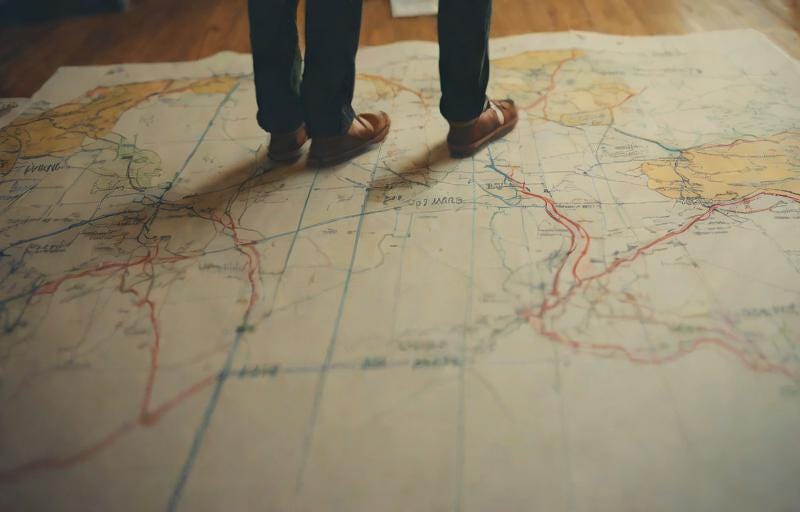Primes and Possibilities
Risk reading for the holidays is on! We’ve coalesced around Human Compatible: Artificial Intelligence and the Problem of Control by Stuart Russell and Humankind: A Hopeful History by Rutger Bregman. (No pressure to read both or any! If you want to participate and read just one or part of one, that’s cool too.) I’ll send out information about a Substack chat later in December.
I’ve been thinking a lot about primes. Not prime numbers, the basis of public-key cryptography, but my prime. The so-called best years of life, whatever that means. How others view it versus how I view it. The risk of squandering it via excessive chance-taking versus the risk of squandering it via over-caution.
Everyone has their own equation, because everyone defines prime differently. Prime is personal. To me, prime means I’m fully engaged with the world around me, capable of contributing in a meaningful way, and able to enjoy the journey. Some people would say prime applies only to people in their 20s and 30s. I don’t agree with that, though I understand where they’re coming from (I think most generally healthy people would be thrilled if they could keep their 25-year-old body throughout the rest of their life!).
But the main point is, prime means something different for each person. And, however you define it, slipping out of it feels like a big risk. Loss is almost always much tougher than gain (which brings its own problems and anxieties): harder to adjust to, harder to accept, harder to transcend.
So, a reframe feels in order. Rather than worrying about losing our prime, maybe it’s better to think about how we might extend our prime (if, in fact, our definition of prime allows for that flexibility). One part of an answer may be to take advantage of our relative strengths as they change over time, shake things up instead of trying to stay frozen in amber.
Primes and Plasticity
A writer I enjoy,
, wrote recently that:I agree with much of what Sam writes and disagree with other points, which is part of the fun. While he’s factually correct that human brains do lose plasticity as we age, adjusting and reacting to new environments is a skill that can be practiced. Open-minded learning and adaptation require exercise, like a muscle. But we are not doomed to senescence without counterbalance.
A simple example: a recent New England Journal of Medicine Evidence study1 showed doing crossword puzzles helps the brain stay fit as we age. Staying in the game is important, however we define the game. Purpose is key. And people need opportunity and hope. This truth doesn’t magically stop applying as we grow older.
Just like practicing the piano a little every day builds greatness, so does practicing plasticity. Is it factually harder for me to learn a new language now than it would have been when I was three years old? Of course, that’s a biological fact. But challenging the brain, and stretching into new disciplines instead of just coasting through the ones I already know, are “difference routines” that can stave off decline. Yes, it feels like pushing a boulder uphill sometimes. But it’s totally worth it. Because sometimes, when I’m writing or walking or thinking or eating, I’ll spark with an idea that feels new, dig into it, explore it, and that happens because I’ve established and maintained the conditions for it to happen.
Rediscovering the Road
Sure, ruts happen, and I’ve fallen into them like anyone else. The key is to recognize that it’s a rut, not a permanent condition, and consciously put in effort to pull myself out and get back on the road. That might mean rediscovering my creativity through risks and hard work, putting myself in unfamiliar and sometimes uncomfortable situations, doing hard things, facing my insecurities, and keeping an open mind about what might constitute a good opportunity (which doesn’t always look like the obvious choice!).
This seeking-discomfort is hard to do, especially if your status quo is one of relative comfort, but it offers a path in which much of your life can be your prime, barring catastrophic illness or injury (aka plain bad luck). Is it higher-risk than just following a prescribed path with no detours or high-variance chances taken? Absolutely. But life is risk. We live on a planet spinning at high speed, shielded by a thin layer of air from a vast void. It’s incredible that we are here at all. Given those big-picture conditions, and how fortunate I am to be able to affect my own conditions at a micro level, I’d rather aim for a 60-year prime than a 10- or even 30-year one.
How about you?
Devenand, D.P., MD, et al. “Computerized Games versus Crosswords Training in Mild Cognitive Impairment.” New England Journal of Medicine Evidence, October 27, 2022.



Love this. I would say that at 60 I am in my prime because of the wisdom I’ve attained. I do recognize a Neuro plasticity difference from when I was younger but as long as I can retain information I know that my experiential insights will continue to grow.
What a great topic! When I get to enjoy Paul McCartney, Bruce Springsteen and the Rolling Stones these days, it is something to consider how important it is to not stop doing the things you love until you must.